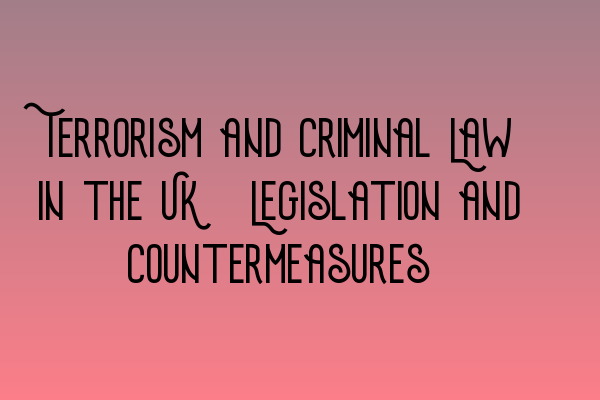Terrorism and Criminal Law in the UK: Legislation and Countermeasures
Welcome to SQE Criminal Law & Practice Law UK, where we strive to provide comprehensive insights into various legal topics. In this article, we will delve into the subject of terrorism and its implications in the context of criminal law in the UK. Terrorism remains a significant threat to global security, and governments around the world have implemented various legislative measures to mitigate and combat this menace.
Legislation and Countermeasures
With the ever-evolving nature of terrorism, the UK government has continuously updated and strengthened its legislation to effectively address and prevent terrorist activities. The primary legislation governing terrorism in the UK is the Terrorism Act 2000, with subsequent amendments introduced in the Terrorism Act 2006 and the Terrorism Act 2010.
The Terrorism Act 2000 provides a robust legal framework to investigate, prosecute, and prevent terrorism within the UK. It includes provisions related to the definition of terrorism, offenses related to terrorism, and powers granted to law enforcement agencies to counter terrorist activities.
Under the Terrorism Act 2000, various offenses are categorized, including but not limited to:
- SQE 1 Practice Exam Questions
- SQE 1 Practice Mocks FLK1 FLK2
- SQE 2 Preparation Courses
- SQE 1 Preparation Courses
- SRA SQE Exam Dates
The legislation emphasizes offenses related to fundraising for terrorism, supporting, and engaging in terrorist activities, as well as the dissemination of terrorist publications.
Moreover, the Counter-Terrorism and Security Act 2015 introduced additional measures to safeguard the UK against the risk of terrorism. These measures include the Prevent Duty, which establishes a legal obligation on specified authorities, including educational institutions and prisons, to identify individuals vulnerable to radicalization and take appropriate actions to prevent them from engaging in terrorism.
The Role of Law Firms and Solicitors
In addressing terrorism-related cases, law firms and solicitors play a crucial role in ensuring the fair and just administration of justice. With their expertise in criminal law, these legal professionals provide legal representation to individuals accused of terrorism offenses, ensuring that their rights are protected throughout the legal process.
Law firms specializing in criminal law often have dedicated teams of solicitors who possess in-depth knowledge of terrorism legislation and countermeasures. These solicitors work closely with their clients, conducting thorough investigations, gathering evidence, and preparing robust defenses to protect their clients’ interests.
The process of representing an individual accused of terrorism involves comprehensive legal analysis, preparation of defense strategies, and engaging with relevant authorities to secure a fair trial.
Conclusion
Terrorism remains a significant concern globally, and the UK has implemented comprehensive legislation and countermeasures to address this threat effectively. The Terrorism Act 2000, along with subsequent amendments and the Counter-Terrorism and Security Act 2015, provide the legal framework necessary to combat terrorism.
Law firms and solicitors specializing in criminal law play a vital role in defending individuals accused of terrorism offenses, ensuring that their rights are protected and that justice is served.
If you want to learn more about SQE exams, you can check out our related articles:
- SQE 1 Practice Exam Questions
- SQE 1 Practice Mocks FLK1 FLK2
- SQE 2 Preparation Courses
- SQE 1 Preparation Courses
- SRA SQE Exam Dates
At SQE Criminal Law & Practice Law UK, we are committed to providing comprehensive resources to help you succeed in your legal journey. Stay tuned for more informative articles on various legal topics.
